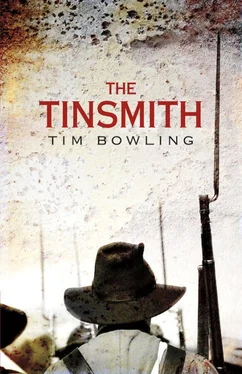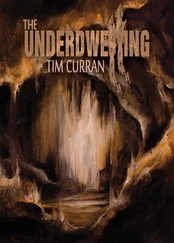A long, rattling gurgle suddenly filled the dead air of the tent. Alarmed, the kind-faced man rose off his haunches and, grimacing, crossed over to the source of the sound.
“Oh mama mama, where are you? Help me oh help me.”
The accent was Southern and heavy. Another long, gurgling rattle followed the words.
“I’m here, son,” came the voice of the kind-faced man. “Rest easy now. That’s right. You just rest your head on my lap and everything will be fine.”
Now when the rattle started, it cut off in midstream and silence rushed in to wash it away. After a few seconds, John heard a sob of anguish, brief, deep, as if drawn from some well far in the earth. When the kind face reappeared, tears lay in the grooves on each side of the nose and in the large brown eyes the colour of creamed coffee. But the voice was not broken.
“And let your beard grow, at least as much as it can. That ugly wound on your cheek won’t matter much now, but later it might draw more attention than it’s worth. And whatever you do, keep your own counsel. A soldier’s silence, especially after a battle, isn’t much remarked upon.”
The kind face hovered a short while longer, then drew slowly away.
John touched the faint hairs of his beard and the torn skin under them. As soon as he did so, time blew open and he was back there again, a slave again, on the farm along the Smoketown Road, near Antietam Creek, with the others.
• • •
The daylight dwindled. John stood at the edge of the barnyard, amazed. He’d never seen so many people there, blacks and whites. There must have been a hundred of them, all standing in the long shadows between the back veranda of the master’s house and the barn. The blacks had been made to come, to profit from the example, but the whites were there for reasons that he didn’t know. The overseer, Orlett, carried an oil lamp as he walked briskly forward out of the crowd of whites, mostly men John recognized but several that he didn’t. There were even a few white women present, their faces almost completely obscured by bonnets drawn tightly at the throat. Caleb stood in front of the overseer, stripped naked with his hands tied behind his back. The overseer looked slowly around with that dog’s grin and then with one kick knocked Caleb down before the whipping post. Then he placed the burning lamp on the ground and said, “Get up, nigger.” Caleb got up, his face blank. The overseer untied Caleb’s hands and ordered two blacks, Jeb and Darius, to lift him just off the ground as the overseer stood on a milking stool and roped Caleb’s wrists to the post high above his head so that his toes barely touched the ground.
The crowd of whites near the back veranda parted slightly, and the master stepped into the light. He wore a hunter’s cap with fur flaps at the ears and a knee-length coat that looked as thick as a hide. Even with all that protection, his cheeks and nose were a vivid red. His breathing was just audible in the silence, and each white puff of breath seemed to weaken him. He leaned on a tall staff as he spoke, his soft voice trembling, then growing strained and high.
“I don’t like having to do this. You know I don’t. But I can’t have thieving here. Maybe you’ve been hearing rumours and believing them. You ought to know better. If there’s a war, it will come and go and things will go on just the same as before. So you’d better get the foolishness out of your heads and be good niggers and do your work. All right, Jacob. John? Where are you, John?”
He was standing closer to the blacks but a little off by himself. Still he could hear Daney breathe like a scared horse and see the girls bite their lips and gaze straight up at the horizon. All their faces shone wet. He knew what the blacks were thinking about him, but he tried to put it out of his mind and look ahead to when the whipping would be over and Caleb would tell Daney the truth. At first he did not hear when the master called his name. Then he walked forward a little and said, “I’m here.”
The master came and stood near him and addressed the whites. “This boy has been loyal to me, he’s the one I was telling you about.” A low murmur of voices spilled through the dark a few seconds before the master said, “I want you to stand close here, John. All right, Jacob, you may proceed.”
The overseer stepped a few paces back as he uncoiled the bullwhip from his waist. The lamplight flickered, brighter now as the darkness came on. The overseer’s breath faded. He grunted as he reared back and lashed out. A loud crack like a frozen branch. Caleb cried out and all the blacks drew breath at once, as if the whip flayed their own skin. The overseer expertly gathered in the whip and made another pass. Caleb didn’t cry out so loud this time. On the third lash, he made only a gasping sound. The blacks’ faces glistened in the yellow lamp glow. Some of the whites smiled, but most had stone faces. Before the whip fell again, one said into the silence, “Runaways’ll get worse.” Then fell the crack of the whip and the grunts of the overseer and the gasps of Caleb as his body twisted a little and the blood from his flayed back rolled down his back and buttocks and legs and dripped onto the ground.
The master did not order the whipping stopped. He stared like a lost child into the crowd of blacks straight at Caleb’s family, at Daney, who was crying and silently laughing too, her mouth open, her teeth shining at the lamplight’s edge. The lashes kept falling. The blood dripped faster. The overseer’s shadow snapped across the ground. The master wouldn’t take his eyes off Daney. After a long while, when Caleb no longer made any sound, the master said, “Check his pulse, John, I’m sure he can stand the whole fifty.”
John did not move. If he touched Caleb now, his hand, too, would be a lash.
“John! I told you to check his pulse.”
The eyes of the whites struck him like hot coals, and he knew the overseer wanted only one chance.
So he stepped up to the whipping post on trembling legs and put his ear to Caleb’s chest and listened for the old man’s life. All he could hear was the blood, the pulse coming up out of the shining pools on the ground. He thought about lying, but the overseer stood too close, close enough to hear Caleb’s blood in the vein.
He told the master that there was a pulse.
“All right, Jacob.”
The overseer took up a bucket from behind him and lifted a soaked rag out of it. The tang of salt filled the air as the overseer slapped the rag onto Caleb’s back. Caleb gasped and bucked slightly, then hung still. The overseer flung the rag back into the bucket. Then he reared back with the whip again.
Later, when the lashes had finally stopped and Caleb was cut down and lay senseless and prone on his stomach, his back a solid shining red, it seemed the punishment was done. The overseer stood motionless, his shoulders slumped, his breath ragged. Not even the whites had anything to say. Most were looking down or had their heads turned to a neighbour. The crowd had tightened into a closer circle.
The master still stared at Daney and she still laughed without making a sound. Some of the whites showed their guns on account of the tense silence flowing out of the blacks. A breech clicked, loud as a breaking branch. The master never even turned when he said, “All right, Jacob.”
The overseer stood over Caleb for a few seconds, his shadow long on the ground, like a plank between the blacks and the whites. Then he reached down and yanked Caleb’s head up by the hair and pulled it against the post. When he nailed the ear to the wood, using just three sharp hammer blows, the sky darkened and the lamplight blazed. And when he took out a knife and sliced the ear off, Caleb’s body slumping again to the ground, full night rushed in and swallowed Daney’s laugh and the master’s stare. For a second the red blade of the knife caught the lamplight. Then the master said, “That’s enough, you can all go back now.” And he went and joined the whites heading toward the house, which rose in the gloom like a cliff.
Читать дальше












